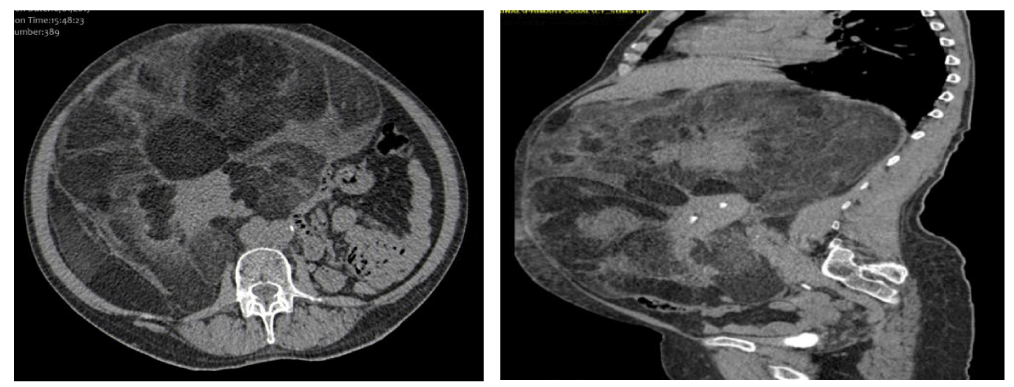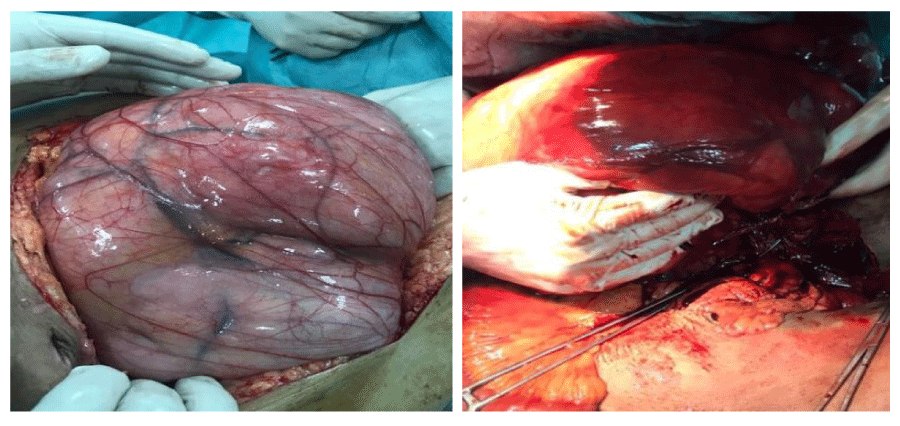Global Journal of Medical and Clinical Case Reports
A giant abdominal well differentiated Liposarcoma: A rare etiology of abdominal mass
Soukaina EL Yazal1*, Abdelouahed Louzi2, Fatima Z Lairani1, Soukaina Jiddi1, Imane Haraki1, Sofia Oubaha3, Zouhour Samlani Sebbane1 and Khadija Krati1
2Department of visceral surgery, Hospital of Erazi, CHU Mohamed VI, Marrakesh, Morocco
3Department of Physiology, Faculty of Medicine, Marrakesh, Morocco
Cite this as
Yazal SEL, Louzi A, Lairani FZ, Jiddi S, Haraki I, et al. (2018) A giant abdominal well differentiated Liposarcoma: A rare etiology of abdominal mass. Glob J Medical Clin Case Rep 5(1): 001-002. DOI: 10.17352/2455-5282.000057Liposarcoma is the most common retroperitoneal sarcoma and represents more than 15% of all sarcomas. Well differentiated liposarcoma is usually located in the extremities. We report the case of a patient with a giant retroperitoneal liposarcoma revealed by an abdominal mass.
Case presentation: A 67 years old woman is admitted to our hospital for abdominal distension and pain that has been evolving for 2 years. Medical examination revealed a huge abdominal mass. Computed tomography (CT) scan showed a giant retroperitoneal mass with regular borders, pressing back abdominal organs and encasing the right kidney evoking a very probable liposarcoma. The patient has thus undergone a surgical resection of the mass alongside with nephrectomy of the right kidney. Histological findings confirmed well differentiated liposarcoma. Postoperative follow up was simple and no recurrent tumor was identified. The only known effective treatment of well differentiated liposarcoma is the complete surgical resection.
Introduction
Liposarcoma is the most common retroperitoneal sarcoma and represents more than 15% of all sarcomas. Several subtypes are described, based on histology, cytogenetic and molecular analysis [1]. Well-Differentiated Liposarcoma (WDL), called also Atypical Lipomatous Neoplasm (ALN), are the most common of liposarcomas, usually developed in the deep muscles of the extremities (75%), less frequently , in retroperitoneum (20%) [2]. we report in this case a giant form of retroperitoneal liposarcoma, encasing the kidney and treated successfully by surgical resection.
Case Report
A 67 years old woman, on her medical history, we noted hypertension and psoriasis, was admitted to our hospital for distension and abdominal pain evolving 2 years ago. The distension was slowly progressive without symptoms of neither digestive occlusion nor thoracic compression. Medical examination found important abdominal distension and a huge solid mass, fixed to the deep plan and occupying all abdominal cavity. Abdominal tomography revealed a giant mass measuring 30x22x26 cm. It had regular contours without capsular invasion and had multiple septa enhanced by contrast. It encased the right kidney and pressed back abdominal organs (Figure 1). This mass was in contact with the abdominal aorta and inferior vena cava without invasion of separation borders. This was an indicator of a very probable liposarcoma. Intraoperative data showed an encapsulated mass, adherent to inferior liver surface, and came back in contact with pancreas and large blood vessels (Figure 2). She underwent a surgical resection of the mass and the right kidney. The macroscopic examination showed a lobular tumor weighting 12 kg and measuring 50x40x18cm. It encased the kidney. Microscopic findings revealed a well differentiated liposarcoma features, totally removed without renal infiltration. Postoperative follow up was simple. She underwent a regular follow up by medical examination and CT scan, no recurrent tumor was found after 2 years.
Discussion
Liposarcoma is a rare mesenchymal tumor, it is frequently located in soft tissue of extremities and in 12 to 40 % in retroperitonium [3-5]. It affects equally men and women during the sixth and seventh decades of life [2]. Clinically, symptoms related to this affection are those of intra-abdominal mass such as abdominal pain, distension and constipation. Because of the deep localization, the tumor is often diagnosed at the advanced stage [6].
Histologically, Liposarcomas are divided to 5 subtypes, related to their cell predominance: Well-Differentiated Liposarcoma (WDL); Dedifferentiated Liposarcoma; Mixoid Liposarcoma; Pleomorphic liposarcoma and Spindle Cell Liposarcoma [1].
Computed tomography (CT) with contrast-enhancing and Magnetic resonance imaging (MRI) can show this tumor as fat density mass, streaky or mottled zones can be present. The localization and contact with intra-abdominal organs should be analyzed [1,3].
Complete surgical resection is the gold standard of treatment; it may include some organs, depending on the intraoperative findings such as kidney, spleen and pancreas… [7]. It can be limited in case of: vessel invasion, spinal cord and visceral invasion exceeding the possibilities of an enlarged resection [3,7].
Prognostic depends on degree of differentiation and quality of surgical resection. Local recurrence occurs often 2 up to 5 years after surgery [3].
- Goldblum JR, Andrew L, Weiss SW (2014) Enzinger and Weiss's Soft Tissue Tumors 484-523. Link: https://goo.gl/Zu8vGA
- Lucas DR, Nascimento AG, Sanjay BK, Michael GR (1994) Well-differentiated liposarcoma: The Mayo Clinic experience with 58 cases. Am J Clin Pathol 102: 677–683. Link: https://goo.gl/e2WnYc
- Mezzour MH, Yasser Arafat El M, Hamid F, Redouane R, Farida M, et al. (2006) Le liposarcome rétropéritonéal géant , Progrès en Urologie 16: 85-88. Link: https://goo.gl/5AVupd
- Benchekroun A, Chikhani O, Ghadouane M, Alami Farih MH, Faik M (2000) Les liposarcomes rétropéritonéaux. A propos de trois cas. Prog. Urol 10 : 446-449. Link: https://goo.gl/ay2pNS
- Bennani S, Debbagh A, Louahlia S, El Mrini M, Benjelloun S (1995) Le liposarcome rétropéritonéal à propos de deux cas. Ann Urol 29 : 154-158.
- Sung Don Oh, Oh SJ, Suh BJ, Shin JY, Oh CK, et al. (2016) A Giant Retroperitoneal Liposarcoma Encasing the Entire Left Kidney and Adherent to Adjacent Structures: A Case Report; Case Rep Oncol 9: 368–372. Link: https://goo.gl/YvmKQG
- S Singer, k Alektiar (2017) treatment recommentations for retroperitoneal liposarcoma; int J Radiation Oncol Biol Phys; 98: 271-274.

Article Alerts
Subscribe to our articles alerts and stay tuned.
 This work is licensed under a Creative Commons Attribution 4.0 International License.
This work is licensed under a Creative Commons Attribution 4.0 International License.


 Save to Mendeley
Save to Mendeley
